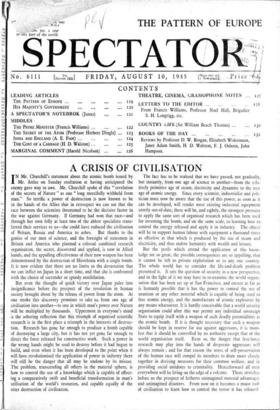A CRISIS OF CIVILISATION
IN Mr. Churchill's statement about the atomic bomb issued by Mr. Attlee on Sunday exultation at having anticipated the enemy gave way to awe. Mr. Churchill spoke of this "revelation of the secrets of Nature" as one "long mercifully withheld from man." So terrific a power of destruction is now known to be in the hands of the Allies that in retrospect we can see that the race between the scientists threatened to be the decisive factor in the war against Germany. If Germany had won that race—and through her own folly at least two of the ablest specialists trans- ferred their services to us—she could have reduced the civilisation of Britain, Russia and America to ashes. But thanks to the genius of our men of science, and the foresight of statesmen in Britain and America who planned a colossal combined research organisation, the secret, discovered and applied, is now in Allied hands, and the appalling effectiveness of their new weapon has been demonstrated by the destruction of Hiroshima with a single bomb. It is now evident that there are no limits to the devastation that we can inflict On Japan in a short time, and that she is confronted with the choice of surrender or speedy annihilation.
But even the thought of quick victory over Japan pales into insignificance before the prospect of the revolution in human society brought about by the release of power from the atom. At one stroke this discovery promises to take us from one age of civilisation into another—to one in which man's power over Nature will be multiplied by thousands. Uppermost in everyone's mind is, the sobering reflection that this triumph of organised scientific research is in the first place a triumph in the interests of destruc- tion. Research has gone far enough to produce a bomb capable of destroying a large city, but it has not yet gone far enough to direct the force released for constructive work. Such a power in the wrong hands might be used to destroy before it had begun to build, and even when it has been developed to the point when it will have revolutionised the application of power in industry there will still be the danger that all may be undone by its misuse. The problem, transcending all others in the material sphere, is how to control the use of a knowledge which is capable of effect- ing a comparatively swift and beneficial transformation in man's utilisation of the world's resources, and capable equally of the utter destruction of civilisation. The fact has to be realised that we have passed, not gradually, but instantly, from one age of science to another—from the rela- tively primitive age of steam, electricity and dynamite to the new age of atomic energy. Since every scientist, industrialist and poli- tician must now be aware that the use of this power, as soon as it can be developed, will render most existing industrial equipment utterly out-of-date, there will be, and rightly, the strongest pressure to apply the same sort of organised research which has been used for inventing the bomb, and on the same scale, to learning how to control the energy released and apply it in industry. The object will be to support human labour with equipment a thousand times as effective at that which is produced by the use of steam and electricity, and thus endow humanity with wealth and leisure.
But the perils which attend the application of this know- ledge are so great, the possible consequences are so appalling, that it cannot be left to private exploitation or to any one country. The whole world has to consider the life-and-death problem presented it. It sets the question of security in a new perspective, and in the light of it we may have to re-examine the world organi- sation that has been set up at San Francisco, and ensure as far ,as is humanly possible that it has the power to control the use of uranium or any other material which is capable of being used to free atomic energy, and the manufacture of atomic explosives by any means whatsoever. It is hardly conceivable that a world security organisation could after this war permit any individual sovereign State to equip itself with a weapon of such deadly potentialities as the atomic bomb. If it is thought necessary that such a weapon should be kept in reserve for use against aggressors, it is mani- fest that it should be controlled by no authority except that of the world organisation itself. Even so, the danger that free-lance research may play into the hands of desperate aggressors will always remain ; and for that reason the sense. of self-preservation of the human race will compel its members to draw more closely together in devising measures for their common welfare, and in providing social antidotes to criminality. Henceforward all men everywhere will be living on the edge of a volcano. There stretches before us the prospect of hitherto unimagined material advantages and unimagined disasters. From now on it becomes a major task of civilisation to learn how to control the terror it has released


























